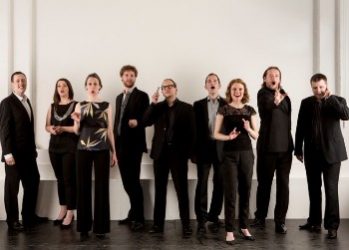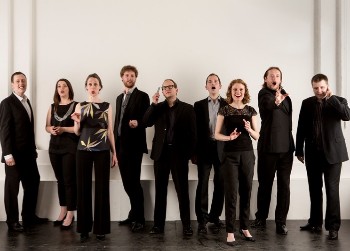 If Carlo Gesualdo were alive today, he would be gleefully deploying all of the technological wizardry that is available to contemporary composers. He’d be experimenting with micro-tonality, and pushing singers to harmonic extremes, just as he did in his own time. And whatever he came up with, the vocal consort EXAUDI, who specialise in new music, would be eager to perform it.
If Carlo Gesualdo were alive today, he would be gleefully deploying all of the technological wizardry that is available to contemporary composers. He’d be experimenting with micro-tonality, and pushing singers to harmonic extremes, just as he did in his own time. And whatever he came up with, the vocal consort EXAUDI, who specialise in new music, would be eager to perform it.
EXAUDI’s concert for Musicon last night followed their usual pattern of mixing the old and the new, and when the old is entirely Gesualdo madrigals, it can be hard at times to tell which is which. In an excellent pre-concert talk, EXAUDI’s director James Weeks highlighted what he thinks can be the biggest obstacle to singing Gesualdo effectively, and which was reflected in the programme’s oxymoronic title – it’s not the blazing chromatic twists, but rather the jerky extremes of emotion in the texts, generally Gesualdo’s own poetry, in which he swerves from joy to despair, light to darkness, life to death, without any connection or progression between them, and the singers have to find a way for them and us to relate to that.
What came across to me in EXAUDI’s performance was a very honest approach to Gesualdo’s manic swings, there was no attempt to soften or disguise them, to make them more palatable. This was Gesualdo served raw and it was glorious. The slow, aching twists of S’io non miro, non moro piled up relentlessly, and in Deh, come invan sospiro the music cycled between languid despondency and rebounds of energy, with the singers bending the tone and sliding between notes to enhance the effect. It often seemed to me that Gesualdo uses the last line of each poem as a final statement to sum up his feelings, and the greater musical weight of these final phrases gives the singers a direction to aim for, for example Itene, o miei sospiri concluding in a mad, tumbling outpouring of joy. In Se la mia morte brani, the text ends with the soul in flight, and the music follows suit, but what I loved in this piece was the way EXAUDI lingered just before the moment of take-off, so that you could feel the pent-up energy ready to be unleashed, like that of an athlete in the starting blocks.
The Cathedral Chapter House offers a luxurious acoustic that doesn’t actually always do singers a favour, as it can blur and soften the musical texture, sometimes ending in mushiness. EXAUDI, however, worked expertly with the acoustic, mainly by stretching out their consonants, so that even though the overall tone of their voices was richly round, the texts remained crisp. They were never afraid to add a harsh edge to their sound for expressive effect, contrasting with with the lovely sweet languour of ‘Io parto’ e no più dissi, che il dolore, a wonderful depiction of someone who insists they’re definitely leaving, right now, but clearly going nowhere. EXAUDI are clearly such a close unit that they didn’t name their individual singers in the programme, so I’m reluctant to single anyone out – but I can’t go without mentioning the stunning low bass notes at the end of ‘Io parto’.
It wouldn’t be an EXAUDI concert without some contemporary music, and we were treated to two world premieres this evening. Christopher Fox regularly collaborates with EXAUDI, and this evening they gave the first complete performance of a madrigal cycle commissioned from him Canti del carcere (‘Prison songs’), based on the writings of the Italian communist Antonio Gramsci, using passages where Gramsci reflects on Dante’s ideas about society, and exploring the idea that music is always poetical, not political.
The first, fantasma, felt like a renaissance fantasia, ephemeral, free-flowing, the composer following where the music takes him. There were bursts of sound, shimmering textures and some interesting effects created by the singers covering their mouths with their hands. The second, senso communo took a rather dense passage about the nature of ‘common sense’ but stripped out the consonants from all of the words except the title. In purely aesthetic terms, this for me was the loveliest of the three to listen to; the music had a hollowed out stillness, that seemed to stop time, and it ended with a beautiful little chant setting a passage from Dante. suo tormento mixes a passage from Dante’s Inferno about how we see into the past and the future with Gramsci’s reflections on it. Fox sets Gramsci’s text conventionally, and interrupts it with disjointed fragments of vocalisations derived from reading Dante’s text forwards and backwards from a central point.
Minute fragments of text provided the basis for the other new work, Recitation by Patrick Hegarty. This had come out of a call for scores from EXAUDI, and by good fortune it happened that Hegarty had used Gesualdo’s Tenebrae Responses as his starting point. Six singers were spread around the Chapter House, and linked with headphones to a sound desk operated by Hegarty. Each singer sang tiny fragments according to directions given by Hegarty: essentially the group became an instrument that he played. There was just enough text in the repeated fragments to feel that it was Latin, and so the overall effect was like wandering around the ruins of a great church, where the glory of the past is reflected in the beautiful remains.
EXAUDI closed the evening with two of Gesualdo’s best known madrigals, the devastating Moro lasso, and to end, Languisce al fin chi da la vita parte, a song of the final departure in death, in which you feel that Gesualdo departs not in peace, but simply because there is nowhere else to go.








